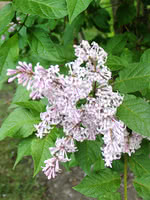Mon-Fri 9am - 5pm Mountain time
Villosa Lilac vs Echinacea
Syringa villosa
Echinacea angustifolia
ONLY AVAILABLE BY CONTRACT GROW
Popular Hedge Species!
Villosa Lilac is a relatively large and cold hardy shrub. It provides excellent privacy and wind protection.
Its fragrant, pink flowers grow in clusters at the end of its branches during mid to late summer and fade to a light pink over time. Villosa Lilac grows quickly and is drought resistant, making it suitable for the outer row of a shelterbelt. Its roots are non-suckering and it does not compete with nearby crops.
If you alternate Villosa Lilac and Common Purple Lilac in your hedge, your hedge will flower for more of the summer than if you plant either Lilac on its own.
Note: Villosa Lilac is more salt-tolerant than most of our stock.
Echinacea is a unique flowering plant that has been used by Native Americans as medicine for centuries.
Tall stalks topped with badminton-birdie-like flowers make this plant a distinctive addition to any garden or yard.
Echinacea this drought tolerant and will attract bees, butterflies, birds and other wildlife.
Villosa Lilac Quick Facts
Echinacea Quick Facts
In row spacing: 0.9 m (3 ft)

